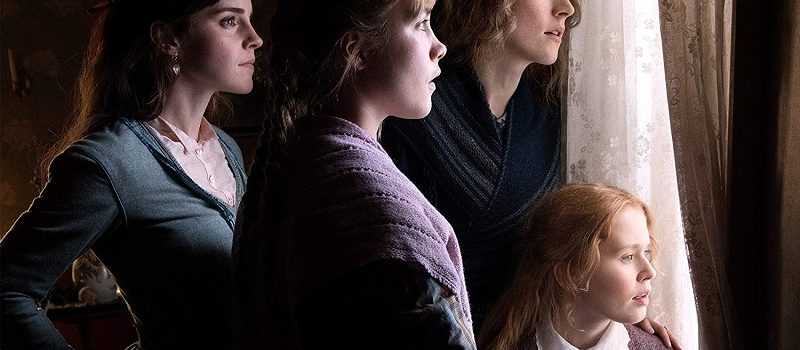For folks who wonder whether we needed another cinematic version of Louisa May Alcott’s beloved classic, Little Women, we have news for you. Yes … you need this movie in your life right now.
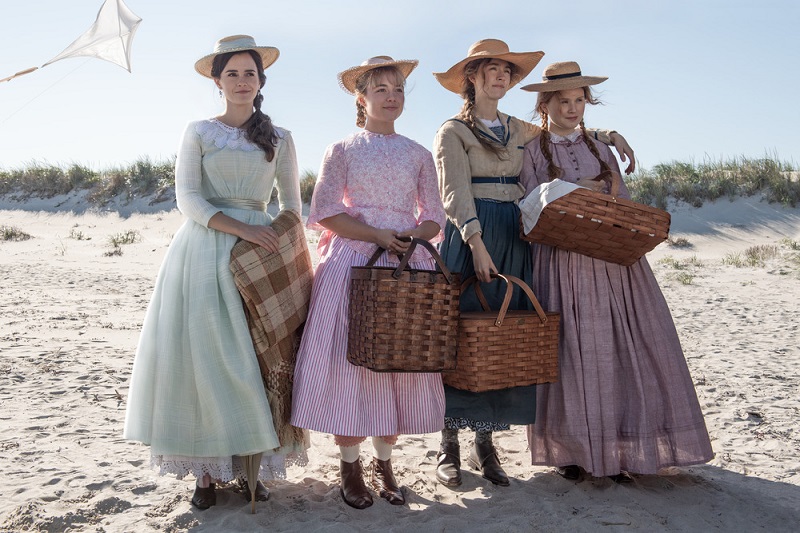
1994’s incarnation, from director Gillian Armstrong, is a favorite of fans of the iconic novel that tells the tale of the March sisters. That flick featured Susan Sarandon as March matriarch, Mrs. March, and Winona Ryder as the plucky Jo March, the writer with dreams of supporting herself with such a vocation. Her older sister, Meg, has supreme talent on the stage may choose to marry instead … was embodied by Trini Alvarado. Beth (played by Claire Danes) faces her fateful future in a manner that inspires the entire clan. Then, there’s Amy (Samantha Mathis), who dreams of the life of a painter—sadly in a world that has few female artists who can make a living. It was stellar casting then, and if it was even possible, writer-director Greta Gerwig (Lady Bird) has upped the ante in her Christmas movie season miracle of a movie.
Gerwig and her Lady Bird star, Saoirse Ronan, lead the way for a more modern version of the often produced Alcott story. How has she altered it, exactly?

Ronan dazzles as Jo, while the rest of the rich ensemble finds Emma Watson as Meg. The well-reviewed “It Girl” of the moment, Florence Pugh (Midsommar, Fighting with My Family) stars as Amy, with Eliza Scanlen capturing our heart as Beth. The matriarch role is inhabited with the purest of love and endearment by Laura Dern. The striking star of Call Me By Your Name, Timothy Chalamet, tackles the role of Theodore ‘Laurie’ Laurence (Played by Christian Bale in the 1994 flick). His immediate chemistry with Ronan’s Jo is pristinely palpable. The icing on the Little Women cake is the casting of one of the greatest actresses of all-time—Meryl Streep—as Aunt March.
The story takes place in Massachusetts during the closing days of the Civil War. Besides being incredibly entertaining, insightful and yes, inspiring, Alcott’s novel is a study of a landscape where women were thought of as only being able to aspire to love and nothing more to improve their place in the world. All four sisters show signs of brilliance in various arenas outside affairs of the heart—although romance does certainly enter the picture quite passionately for those characters who are warm to it, most notably Meg. Amy would love nothing more than to go to Paris and study the great painters and aspire to be their equal one day. Beth, meanwhile, has a gift of musicianship. She can turn an old piano into a masterpiece. When she’s gifted a pristine piano by her neighbor, Mr. Laurence (Chris Cooper, recently seen in A Beautiful Day in the Neighborhood), her sonic succulence knows no bounds. Then, there’s Jo. Her writing is known by all to be rich and possessing the power to grab whoever reads it and never let them go. Yet, over the course of Gerwig’s Little Women, these women all make choices that run the gamut from being independent to secure to even choosing love over a personal goal … fitting of women of that time, and in many ways, today.
What Alcott illustrated in her iconic novel, and it’s intertwined beautifully throughout Gerwig’s version, is that women can make decisions for themselves. Although their life paths may be littered with supreme challenges, in the end with intense work and fierce determination, a woman of this era could potentially move past societal expectations. That’s a lot of “coulds,” but witnessing the March women over the course of two delightful hours, there’s a whole lot to embrace. At the least, it is a triumph of the sheer possibilities of the future being what you make it.
Complicating things is Mr. Laurence’s grandson, the dashing Laurie. He and Jo are BFFs from the start. But for him, the relationship has firmly moved into the amour realm and for Jo, that is a complication she does not need nor want. Her sights are firmly set on moving to New York and becoming a professional writer, something a woman of that age can achieve, even if it is within the frameworks of a male editor’s opinion of what a good story should contain. Laurie intertwines himself delightfully into the lives of the Marsh family. In fact, as was the case of that time, if one sister rejected a proposition, another may just be up for the amorous endeavor.
Ronan is a vision of Alcott characterization incarnate. Comparing her Jo to Ryder’s Jo is apples and oranges, these are truly different incarnations of Little Women. There is just something about Ronan that is like a lightning bolt through the screen that shoots directly into our collective hearts. From the moment we first saw her in Atonement and then how she carried an entire film, Hanna, at the age of 15, this is an actress whose gifts blossomed early and continue to rise to unforeseen heights of greatness.
We feel her frustration with the society she was born into. In fact, she says so in a powerful monologue delivered to Dern’s Marmee. Yes, Jo, women are capable of so much more than just love and thanks to you and this ensemble of strong, intelligent and willful women in Alcott’s book, generations of females aspired to much more than what society deemed was only theirs to grasp. Her chemistry with her onscreen sisters is electric. Ronan’s flirty fun interaction with Laurie is ripe with glee, even if she admits that she never wants to marry—a fact that Aunt March sees as ludicrous.
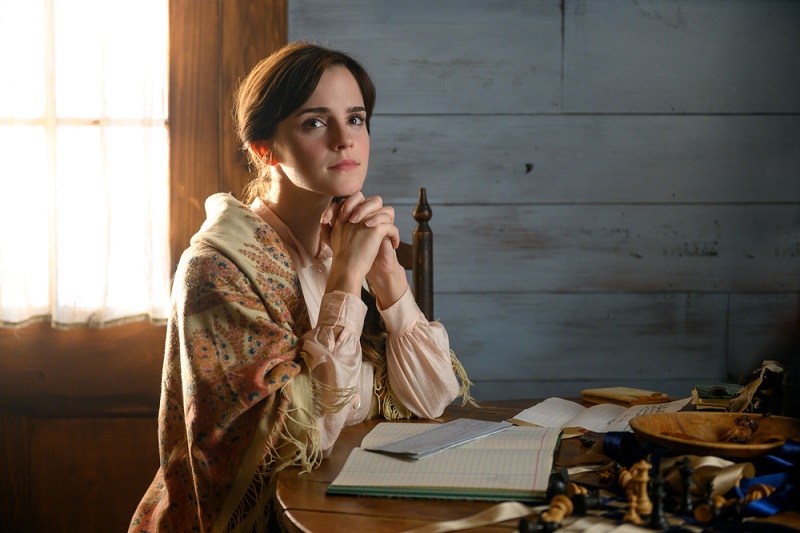
Watson plays subtly and nails her Meg. She’s a glorious woman whose thespian talents match her desire to marry and start a family. Meg supports Jo in her dreams, yet requests that her sister respects hers as well. Through Watson’s performance, there is little to argue with as the sentiment is felt through the screen and into Meg’s core. Again, it is a choice that only she can make and should be hers solely, because it is unequivocally hers to make. The Harry Potter veteran has made some rich choices since the JK Rowling film franchise faded into a beautiful Hogwarts sunset. This supporting role in Little Women is further proof that this is an actress working at the top of her game, and like Ronan, that game is absolutely entrenched with exponential potential.
Pugh has had quite a year. Gerwig’s film is the cap on a talent announcement that could not have been more pronounced. Her Amy is a woman caught in between societal alterations. She aspires to marry as much as any female of that era, but still possesses passion for her art and has a firm belief that those talents will take her places. As embodied by Pugh, 2019’s Amy is the pitch perfect model for the woman in evolving times.
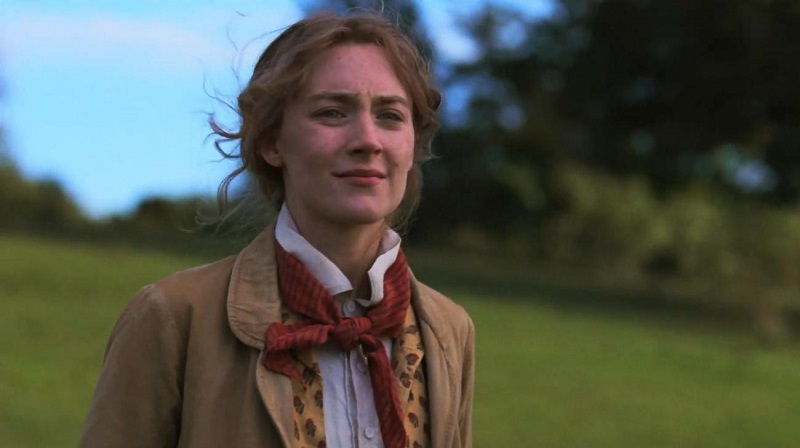
Gerwig was exactly the person that a twenty-first century version of Little Women should be helmed by and does so with a command of the material that has to be second to none. Proof of that lies in her decision to play with the timeline of Alcott’s novel. She commences with Jo already in New York City trying to make it as a writer, and then jerks back to seven years prior. Her story is told that way throughout. At times it works wonderfully, but other times it is a bit of an emotional distraction. When a certain character meets her fate, where it lies in the novel and in the 1994 film is as emotionally riveting as cinema and literature can achieve. Yet in Gerwig’s version, that emotive beat is placed somewhere in the middle and its triumphant conclusion is therefore slightly different than the narrative laid out by Alcott. It largely works and is the boldest of moves by a helmer showing her confidence.
Something unexpected from Gerwig’s Little Women is its power to inspire. If someone like Jo can make it as a writer in the Civil War era of America, then in truth the only thing holding you back from achieving life goals is oneself. There is something in each of the March sisters’ unique talents that should resonate with those who experience this triumphant film. Prepare for exiting the theater ready to tackle that long forgotten passion or continuing work on one already in motion.
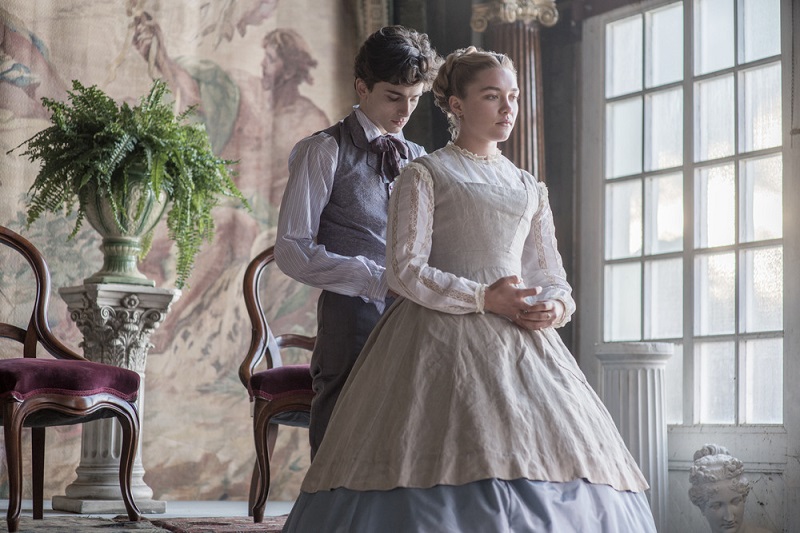
Gerwig’s Little Women could be easily seen as a beloved story about four sisters and their bond. But the story from Alcott is truly about much more than that. It’s a tale and film that pushes the viewer to never forget pursuing dreams, yet never at the cost of alienating family. That is because family is all we have. Nobody knows us as well as the people who we grew up alongside. Even if they do not seem to be our biggest cheerleader at one moment in time, in the end they are always an emotional rock. That fact illustrates why it is so good to come home and even more profoundly, Alcott has astoundingly laid out timelessly what it means to be human.
Grade: A

